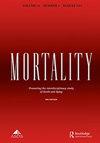菲律宾英雄陵园语言景观中墓志铭的交际功能
IF 1
0 HUMANITIES, MULTIDISCIPLINARY
引用次数: 0
摘要
摘要菲律宾墓地的研究传统上被置于考古学的范围内,从广义上讲,它在物质文化中占有重要地位。为了进一步扩大我们对这些遗址的了解,本文探讨了菲律宾墓地,特别是Libingan ng mga Bayani (LNMB),如何通过其语言景观(LL)产生意义。运用地方符号学方法和索引性,本研究确定了LNMB墓志铭的七种交际功能:(1)情感功能、(2)联想功能、(3)庆祝功能、(4)记忆功能、(6)渴望功能和(7)总结功能。在此过程中,本研究不仅将公共标志视为传达意义和语用功能的交际“演员”,而且还将与墓志铭“互动”的行为分析为高度语境化的言语事件。最后,本研究认为,墓志铭象征着记忆、纪念和爱国主义的话语,并反映了社会文化和政治现实,所有这些都有助于将LNMB创造为一个不仅是墓地本身,而且是一个体验和体现的地方。关键词:交际功能、地理符号学、语言学景观、利比亚、利比亚、利比亚、巴尼亚索引性致谢我要感谢Marie Cecilia L. Manalastas在我到利比亚进行数据收集和实地考察期间的协助。没有她,这项研究是不可能的。我也要感谢那些在迪里曼菲律宾大学举行的第15届菲律宾语言学大会上分享他们对本文初稿的精彩见解和评论的人。披露声明作者未报告潜在的利益冲突。作者简介:nicko Enrique L. Manalastas是菲律宾迪利曼大学英语和比较文学系的研究生助教。他在《多模式通信》杂志上发表了题为“(去)怪物COVID-19: 2019-2022年菲律宾社论漫画中COVID-19病毒多模式隐喻的历时研究”的本科论文的一章。他的研究兴趣包括菲律宾媒体中的多模态隐喻,LGBTQ+语言学,菲律宾符号学和语言景观。可以通过电子邮件nlmanalastas@up.edu.ph与他联系本文章由计算机程序翻译,如有差异,请以英文原文为准。
The communicative functions of epitaphs in the linguistic landscape of Libingan ng mga Bayani (Heroes’ Cemetery), Philippines
ABSTRACTThe study of Philippine cemeteries has been traditionally placed within the purview of archaeology, which, broadly speaking, places importance in its material cultures. To further broaden our knowledge about these sites, this paper explores how Philippine cemeteries, particularly Libingan ng mga Bayani (LNMB), generate meaning through their linguistic landscape (LL). Using place semiotics approach and indexicality, this study identifies seven communicative functions used in LNMB epitaphs: (1) affective, (2) associative, (3) celebrative, (4) memorative, (6) desiderative, and (7) summative. In doing so, this study not only treats public signs as communicative ‘actors’ which convey meaning and pragmatic function but it also analyzes the act of ‘engaging’ with epitaphs as a highly contextualised speech event. Finally, this study argues that epitaphs signify discourses of memory, remembrance, and patriotism and index sociocultural and political realities, all of which contribute to the creation of LNMB not only as a cemetery per se but also as a place of experience and embodiment.KEYWORDS: Communicative functionsgeosemioticslinguistic landscapeLibingan ng mga Bayaniindexicality AcknowledgementI would like to express my gratitude to Marie Cecilia L. Manalastas for assisting me during the data collection and fieldwork trips to the Libingan. Without her, this study would not have been possible. I would also like to thank those who shared their wonderful insights and comments on an earlier draft of this paper during the 15th Philippine Linguistics Congress held at the University of the Philippines in Diliman.Disclosure statementNo potential conflict of interest was reported by the author.Additional informationNotes on contributorsNicko Enrique L. ManalastasNicko Enrique L. Manalastas is a Graduate Teaching Associate in the Department of English and Comparative Literature at the University of the Philippines in Diliman. He has published a chapter of his undergraduate thesis entitled “(De-)Monstering COVID-19: a diachronic studyof COVID-19 virus multimodal metaphors in Philippine editorial cartoons, 2019–2022” in Multimodal Communication. His research interests include multimodal metaphors in Philippine media, LGBTQ+ linguistics, and Philippine semiotic and linguistic landscapes. He may be reached by email at nlmanalastas@up.edu.ph
求助全文
通过发布文献求助,成功后即可免费获取论文全文。
去求助
来源期刊

Mortality
Arts and Humanities-Religious Studies
CiteScore
1.80
自引率
12.50%
发文量
42
期刊介绍:
A foremost international, interdisciplinary journal that has relevance both for academics and professionals concerned with human mortality. Mortality is essential reading for those in the field of death studies and in a range of disciplines, including anthropology, art, classics, history, literature, medicine, music, socio-legal studies, social policy, sociology, philosophy, psychology and religious studies. The journal is also of special interest and relevance for those professionally or voluntarily engaged in the health and caring professions, in bereavement counselling, the funeral industries, and in central and local government.
 求助内容:
求助内容: 应助结果提醒方式:
应助结果提醒方式:


